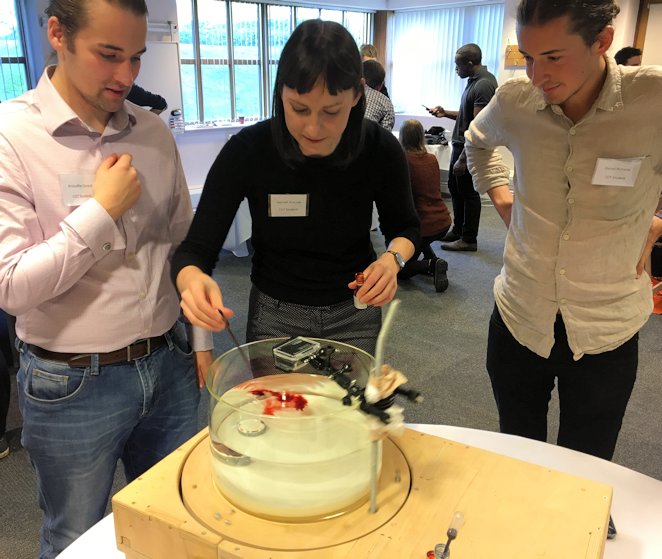A week as a CDT student
Rory Hetherington, first year CDT student (2016)
Our typical week during the first semester combines lectures, lab practicals and computer practicals. Theory covered in lectures is applied to fluid flow problems during computer practicals and lab experiments. Content during the first semester is mostly taught, whereas content in second semester is more research-based.
In the second semester we work towards our MSc team project. Each member of the team is allocated to one component of the work (usually split by theory, CFD, experiments). During the week we focus most of our attention on our individual component of the project, but we also attend team meetings to discuss the group's direction. Our MSc projects are linked to industry and we are given the opportunity to work at a company linked to our project for up to a week.
Through semester 1 and 2 we also participate in workshops and seminars as part of the professional development module. We attend weekly MHD/Fluids seminars in the School of Maths and also seminars aimed at the first year cohort of the CDT. Both cover a huge range of topics and help broaden our knowledge of the subject. In semester 2 it is possible to focus your professional development more towards your PhD topic, for example by going to additional seminars which are linked to your research. We are also encouraged to promote science to the general public by presenting at public engagement events, such as the Be Curious science festival.
View Rory's profile
Caitlin Chalk, second year CDT student (2016)
As a second year CDT student, my week typically involves a variety of things relating to my PhD research, my taught modules and my professional development. Unsurprisingly, my PhD research is what occupies most of my time. I am looking at the behaviour of landslides and the models that can be used to simulate them. This work includes analytical, experimental and numerical aspects. So far, my main focus has been using Computational Fluid Dynamics (CFD) to model simplified landslide cases. This has included working with both mesh based (Volume of Fluid) and mesh free (Smoothed Particle Hydrodynamics) modelling techniques. I have recently returned from a three week placement at the Universidad de Politecnica de Madrid, where I was learning how to use an advanced SPH code that was written specifically for landslide modelling.
I have recently started the planning of my experimental work, which involves a lot of research and preparation. Once the experiments are under way, I expect that some weeks will be spent entirely in the lab. In addition to experimental and numerical modelling, a typical week involves a lot of reading around my subject area. I am currently compiling this information into a literature review, with the aim of understanding the current knowledge base and identifying how my research fits in. I usually meet with my main supervisor once a week to discuss the progress that I have made and any problems that I may have encountered. A meeting with my full supervisory team takes place on a monthly basis. This is a chance to discuss my research with my co-supervisors who work in different areas.
Alongside my PhD research I need to balance my taught MSc modules, which are relevant to my research topic. I am studying one module each semester, so my week consists of around 4 hours of taught lectures. In addition to this I make time for coursework and exam revision. I also usually attend at least one research seminar per week. These will often be related to my research in some way, for example they discuss the same numerical methods that I am using but applied to a different area. I sometimes attend seminars that aren't related to my research but cover a topic that I find interesting. This is an opportunity to network with other research students and find out about their research. As part of my professional development I attend some training courses, most of which have the aim of improving how I approach my research. Others are specified towards demonstrating duties, which I take part in. I regularly demonstrate for undergraduates in Civil Engineering laboratories and participate in marking their coursework.
View Caitlin's profile

